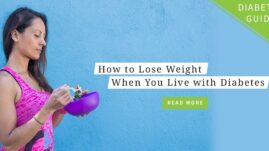Have you ever asked yourself, “Why am I gaining weight when I’m eating practically nothing?”
It could be the type of diet you’re following, or perhaps extra calories are sneaking in through frequent snacking or dining out. Or maybe cutting back on calories is actually contributing to the weight gain. Could that really be true?
This article will explore the factors affecting your weight, how overly restricting calories can harm your overall health, and the steps you can take to get back on track with your weight-loss goals.

Key Points:
- If you’re having difficulty losing or are gaining weight, a higher-protein diet may be more effective than other diets for weight loss.
- Incorporate regular physical activity, prioritize sleep, and manage stress, as these can impact weight-loss success.
- Certain medical conditions and medications can hinder weight loss or even contribute to weight gain. If you suspect this, consult your healthcare provider.
- Monitoring what and how much you eat significantly increases the chances of losing weight and maintaining it.
If you ask people how often they’ve gone on a diet to lose weight, many will likely say, “Too many times to count.” Maybe you’ve tried multiple times yourself, only to regain the weight — and then some. Or perhaps you didn’t lose any weight while dieting, or even gained weight. It’s undeniably frustrating.
While it may seem counterintuitive, eating fewer calories can sometimes lead to weight gain. This is often due to the body’s natural response to calorie restriction, known as metabolic adaptation or adaptive thermogenesis.
When you drastically cut calories, your body conserves energy by slowing your metabolism, making it harder to lose weight and easier to gain it.
Table of Contents
What the science says
You’re not alone in your weight-loss journey. The U.S. Centers for Disease Control and Prevention (CDC) reports that between 2013 and 2016, 49 percent of U.S. adults tried to lose weight within the past year.
More women (56 percent) than men (42 percent) were among those trying to shed pounds, and more than 160 million Americans are dieting at any given time.
Understanding the science behind weight loss helps explain why it can be so challenging, and why some people find it harder than others. However, the science isn’t as straightforward as we once thought.
The foundation of weight loss is a calorie deficit — when you consume fewer calories than your body uses, you lose weight. The body taps into its reserves (usually fat stores) to provide energy.
Based on this, we assume:
- Eating fewer calories than we burn leads to weight loss.
- Eating more calories than we burn leads to weight gain.
But the saying “a calorie is a calorie” isn’t entirely accurate. While a calorie is a unit of energy, the source and composition of those calories affect metabolism, satiety (feelings of fullness), and overall health differently.
For example, two diets with the same calorie count — like a low-fat diet versus a low-carb/high-protein diet — may not lead to the same weight loss.
Studies show that higher-protein diets often result in more weight loss by boosting satiety and energy expenditure. These diets also increase fat-free mass (muscle) and burn more calories, even at rest, compared to diets higher in carbs or fat.
Surprisingly, even eating, digesting, and storing nutrients burns calories. This process, called the thermic effect of food (TEF), accounts for about 10 percent of daily energy expenditure. TEF varies depending on the macronutrient composition of a meal:
- Protein: 20 to 30 percent of calories burned
- Carbohydrate: 5 to 10 percent of calories burned
- Fat: 0 to 3 percent of calories burned
In other words, protein has the highest TEF, followed by carbohydrates, with fat having the lowest.
Other factors that affect TEF include:
- Age: TEF tends to decrease as we age.
- Physical activity: More active people often have a higher TEF.
- Meal size: Larger meals increase TEF.
- Eating frequency: One large meal leads to a higher TEF than several smaller meals.
- Food processing: Less processed foods increase TEF.
In summary, the idea that “calories in, calories out” explains weight loss is outdated. Weight loss involves more than cutting 3,500 calories to lose a pound. Not all calories are equal, and factors like age, metabolism, activity level, and the types of food you eat all influence how much weight you’ll lose.
Other factors that affect weight loss
Calories still matter when it comes to weight loss — you need to be in a calorie deficit to shed pounds. However, beyond the nutrient composition of your diet, several other factors can influence whether you lose weight:
- Lifestyle habits: The types of foods and beverages you consume, along with how much time you spend sitting or lying down, can affect your progress.
- Environment: Where you live and work matters. Your access to healthy foods, a kitchen at work to store or prepare meals, and safe spaces to walk or be active all play a role.
- Sufficient sleep: Not getting enough sleep — or enough quality sleep — can disrupt appetite-regulating hormones, lower metabolism, and lead to frequent snacking on less-healthy foods, contributing to weight gain.
- Medications: Certain medications can make losing weight more difficult and may even cause weight gain. Examples include steroids, some diabetes medications, and certain blood pressure drugs.
- Health issues: Conditions like hypothyroidism, polycystic ovary syndrome (PCOS), eating disorders, and depression can lead to weight gain or make weight loss more challenging.
- Gut microbiome: The organisms in your gut, known as the microbiome, can influence how many calories you absorb from food. Studies show that people who are naturally thin tend to have a different microbiome composition than those who are overweight or obese.
Can eating too few calories decrease your metabolism?
In short, yes. Drastically cutting your calorie intake might seem like a quick way to lose weight, but it can backfire.
While you may initially lose weight, your body will adapt to the reduced energy intake by slowing down your metabolism, a process known as metabolic adaptation or adaptive thermogenesis.
Here’s why this happens:
- Reduced metabolic rate: Slashing calories forces your body to conserve energy, leading to a lower metabolic rate. As a result, you burn fewer calories, which slows down your weight loss over time.
- Persistent metabolic slowdown: A slower metabolism can continue even after you stop dieting, which helps explain why many people regain weight after a period of calorie restriction.
- Muscle loss: Very-low-calorie diets (800 to 1200 calories per day) may be effective for short-term weight loss but aren’t ideal for the long term. Extreme calorie restriction can lead to muscle loss, which lowers your metabolism and decreases the number of calories you burn at rest. This can contribute to weight gain even if you’re eating less.
- Hormonal changes: Hormones that regulate hunger and satiety can also be affected by calorie restriction, potentially leading to weight gain. Hormonal imbalances can play a significant role in weight gain, even when calorie intake is low.
How tracking your food intake impacts weight loss
Tracking your food intake while working on losing weight can significantly impact how much weight you lose.
Though it may seem tedious, research shows that between 18 percent and 70 percent of people underreport their food intake. This doesn’t mean people are deliberately misrepresenting what they eat — it can simply be difficult to accurately gauge how much you’re eating, especially without weighing, measuring, or tracking your meals.
Using a food journal or a tracking app can help keep you accountable for what, when, and how much you eat. If you’re honest with yourself, tracking can be very revealing. Here’s how keeping a food journal can help with weight loss and maintenance:
- You learn about your eating habits, such as how often you eat, whether you skip meals, or if you frequently eat out.
- You identify foods you tend to eat regularly, including your “go-to” comfort foods when watching TV or having a bad day.
- You begin to connect what you eat with how you feel — are you eating out of boredom or because you’re feeling down?
Another important part of food tracking is becoming more aware of portion sizes. Since people tend to underestimate how much they eat, weighing and measuring your foods — at least temporarily — can give you better insight into your actual intake.
Studies show that those who track and measure their portions tend to lose more weight than those who don’t. Periodically tracking and measuring, even after reaching your goal weight, can help prevent regaining the weight you’ve lost.
Why undereating could be hurting your health
Very-low-calorie diets may seem appealing, and when closely monitored by a healthcare provider, they can help with short-term weight loss.
However, severely restricting your calorie intake can put your body into a state of starvation, increasing the risk of malnutrition and potentially serious health issues, such as:
- Loss of muscle mass
- Loss of heart muscle, leading to a slow heart rate and low blood pressure
- Reduced lung capacity, causing difficulty breathing
- Numbness and tingling in the hands and feet
- Low body temperature
- Fluid buildup in the arms, legs, and abdomen
- Dry hair and skin
- Hair loss
- Impaired ability to fight infections and heal wounds
- Anemia
- Osteoporosis
- Difficulty concentrating
- Depression and anxiety
Additionally, not eating enough can increase the risk of developing eating disorders or disordered eating. If you experience any of these symptoms, particularly while on a weight-loss plan, it’s important to let your healthcare provider know.
Tips to help you lose weight and keep it off
Losing weight isn’t easy, and the risk of regaining weight is high.
Plus, weight loss isn’t always a linear process — you’ll likely have days or weeks when you lose weight, along with times when you hit a plateau. This is completely normal! Don’t let a plateau discourage you.
If you’re not losing weight despite cutting calories, try these steps to boost your chances of success:
- Consult your healthcare provider and dietitian: Develop a safe weight-loss strategy that fits your lifestyle and food preferences. Discuss whether a higher-protein diet might be right for you.
- Set realistic goals: Break them into long-term and short-term targets. For example, your long-term goal could be to lose 25 pounds over three months, while a short-term goal could be losing 1 to 2 pounds per week.
- Measure your portions: Use a food scale and measuring cups to help control portion sizes.
- Track your intake and activity: Keep a record of what you eat and your physical activity using a notebook, spreadsheet, or smartphone app.
- Get moving: Aim for at least 150 minutes of physical activity each week. Start slow and increase your activity gradually.
- Prioritize sleep: Sleep and weight loss are closely connected. Not getting enough sleep can make losing weight harder.
- Weigh yourself regularly: Weighing in once a week can help you catch and correct any upward trends in your weight.
- Manage stress: Chronic stress can lead to overeating and weight gain, so finding healthy ways to cope is essential.
- Seek support: Lean on family and friends, or consider joining a weight-loss group or program for encouragement.
- Check in with your healthcare team: If you’re stuck in a plateau, not feeling well, or feeling discouraged, reach out for guidance.
- Celebrate small victories: Focus on improvements beyond just the number on the scale, like better sleep or increased energy.
Key takeaways on your weight-loss journey
Losing weight is a journey with inevitable ups and downs (literally!). Keep in mind that everyone’s weight loss timeline and progress are different, both in how long it takes and how much weight is lost.
If you’re gaining weight despite eating less and being more active, consider other factors that could be affecting your progress, such as lack of sleep, stress, medications, or underlying health conditions.
Collaborating with a dietitian or your healthcare team can help you identify and address these challenges, so you can stay on track toward achieving your weight loss goals.
Did you find this article helpful? Click Yes or No below to let us know!





bob
Hi, in the past I have been binge eating at night and gaining up to 2 pounds over night, then not eating the next and repeating the same process. My weight flucuated betweeon 130-125 before this time. I have improved and have stopped binge eating. I feel like my metabolism slowed down because of this, are there any ways to speed it up?
Christel Oerum
Congratulations on breaking the binging cycle! That’s an amazing accomplishment. I’d suggest keeping a close eye on what you eat (if you can do that without triggering any unwanted eating patterns) and focusing on a combination of resistance training and cardio. Give it time, and with a structured calorie deficit you will see results
Sally
HI,
I am 16 years old and have been eating clean for more than a year now. However, my weight is not dropping, I am eating foods such as sushi, vegetables, egg, chicken, potato, a small handful of nuts and fruit. I try to minimise my intake of bread and rice for a long time now and have not put a sweet or chocolate or chips or any junk food in my mouth for more than a year now. However slight changes happen and then if I eat one little extra fruit I gain all the weight back and I mean the way I look (really bloated stomach even though i don’t feel bloated). I have been trying for so long to loose weight now and nothing seems to work. I used to go to the gym for one month straight and burned 300-900 calories a day but saw no change. I really don’t know what I am doing wrong. I weigh 75kg and want to be 55kg what can I do?
Christel Oerum
You can eat all the right “clean” food but if you’re not at a calorie deficit you won’t lose weight. My approach would be to track what you eat and your activity for 2-4 weeks and make adjustments based on what you see. If you maintain with your current plan you’ll have to decrease calories or increase your activity. And remember change takes time and consistency
Chlo
Hello I’m 15 and I used to be very overweight and I have lost over 25 kilos over bearly eating for this whole year and lost my period and recently I think iv gained weight over this week when I have bearly eaten everything what should I do
Christel Oerum
So that is obviously not a sustainable or advisable approach. You can lose weight without starving yourself. My approach would be to add in 50-100 calories a week and slowly build up to a sustainable level. That will be scary at first, but your body clearly needs more food. If you can, consider hiring a coach or nutritionist to help guide you.
And you might want to step off the scale. Instant weight loss or gain is not really possible, so if you’re up 1 lb. overnight it will most likely not be fat but rather water or food/waste still in your system.
Chlo
How much weight will I gain and when would I be able to eat normal again
Christel Oerum
If you don’t overeat you shouldn’t gain fat. I highly recommend working with someone who can guide you in a structured way. I can only give general guidance
Morrigan
Hi there, I have a slight problem… I recently realised that I am not eating enough. Today I felt like I ate a lot (with healthy snacks and all) and decided to put every info into a calorie counting app. I had 1400Kcal. In the previous weeks I had even less, sometimes when I checked it didn’t even reach 700Kcal. However, I did not lose weight (or at least not much). I feel lightheaded, dizzy and extremely weak. I don’t do much excercise, I walk for 1-2 hours 3 times a week. Could not eating enough lead to dizziness, even tho I did not lose weight? Should I try eating even more and risk gaining weight?
Christel Oerum
Not eating enough could be what makes you feel extremely weak however it could also be a lot of other things. I’d recommend you start by seeing a doctor to ensure that you don’t have any other underlying issues. Although an extremely low-calorie diet isn’t recommended, if you’re in a calorie deficit you should lose weight. If your doctor gives you the green light you can start slowly increasing your calorie
Daniel Jones
I do 484 calories while at work eating oatmeal, 2 bananas and any vegetables I cook when I leave work I workout at gym burning about 300 to 400 calories a day then I go home and eat more veggies for dinner is that bad to I only do it during the week but I lift weights…so do you think this way is good or bad long-term
Christel Oerum
If you’re telling me that you’re eating less than 500 calories a day, then yes, I think that’s a horrible idea. If you insist on eating that little please reach out to a registered nutritionist so they can help you get the vitamins you need
Jad Ismail
you have a typo. “If you are providing your body with the energy it needs to fuel your ” should be ” if you are not providing”
Tobias Oerum
Thank you for letting us know. We have fixed it now.
Wendy
Hi
I’ve always been a size 8 to 10. Until in my 40s. I did stop eating much because I just can’t face it or not hungry at all. My family make me something at times and say if I don’t eat then they wont. Mostly once a week. But mostly I have two sandwiches of ham or cheese and salad cream no butter and on white bread. But since not eating much and constantly in pain with IBS I have gained weight up to a size 12. Please can anyone help . Its quite frightening.
Thank you wendy
Christel Oerum
If you’re gaining a significant amount of weight and hardly eating I suggest you see your doctor. The lack of appetite and weight gain could be a sign of an underlying issue.
And remember, you also have to consider what else you’re consuming when you look at your daily calorie intake, such as calories drinks and snacks
Kelia
Hello am 15 years old and am very over weight and I have been making my self to starve for the whole day but nothing works I have been doing it for so far 3 months and about exercise I am really very lazy to do them even though I go for jogging just one lap am already tired so what would you advise me I
Christel Oerum
If you’re truly not eating anything (which I wouldn’t recommend for anyone) and not losing weight then you need to see a doctor because then something is off. If you boil it down you need to be in a calorie deficit to lose body fat. So you can reduce your calories or move more. Try tracking everything you eat (including calorie drinks) and see where you’re at. There might be calories sneaking in where you least expect it
Kiera
Hi! I used to have an eating disorder and have been recovering for about a year. However, a few months ago I fell back into the mindset and I began to severely restrict my calories (going from ~2700 cals a day to ~1100 cals a day). This slowed my metabolism down so much! I gained 20 lbs in about 3 months. What would you recommend I do to lose those 20 lbs? I fear that eating more to restore my metabolism will make me gain weight by a caloric surplus, but eating less will only slow my metabolism more and pack more pounds on. Any advice would be appreciated, thanks!
Christel Oerum
In an ideal world, you’d increase your calories slowly and work away from the obsessive food behavior. That is, of course, easier said than done. If you don’t feel like you can do that on your own, one option could be to work with a nutritionist who specializes in diabetes, as well as a psychologist.
As for your weight gain. You shouldn’t gain 20 lbs. if you’re in a calorie deficit. If you gained 20 lbs. in 3 months on 1100 calories, I’d recommend you see a doctor because that sounds like something else might be going on.
Jade
Hey, I’m also in recovery from a eating disorder and lately have fallen in to bad patterns… instead of loosing weight on a low intake of food a day I seem to be gaining… it’s frustrating sense I don’t have any answers to why this is happening. Just wondering if you got to the bottom of the reason you’re body gained weight?
Robert smith
I agree – my advice would be to extend the diet period. Also I’ve found the simplest way to lose weight is substitute lettuce for bread and when you feel peckish, have a prepared bowl of salad in the fridge to snack on. The difficulty I have is breaking the behavioural pattern of reaching out to the fridge every time an irritation or anxiety causing stimulus pushes me in that direction. Also, if making the vingrette for the salad – go easy on the olive oil. Add cider vinegar and a little salt and black pepper and also consider adding a little of your favourite sauce. Salads can be very filling. Especially if you add gently cooked anf cooled diced aubergine along with thinly sliced cucumber.I lost 10kg in 6 months by gently dropping out at least one slice of bread from six slices per day this also reduced the intake of sandwich spread/butter. Slow is best and likely to be more sustainable. Most important try not to eat anything past 7pm on any night.
Wendy Capewell
Hi, I fall into the category of dieting to much and as a result of that I am unable to lose weight. I understand the process etc but I fail understand what you are saying, Are you able to explain it in more simple terms. Thanks
Christel Oerum
Hi Wendy,
I’ll try and simplify Dai’s point.
When you diet for too long and too aggressively it seems that your boy adapts to the calorie deficit and weight loss becomes increasingly hard. We also tend to bounce back and gain a lot of weight when we stop dieting.
What you can do is slowly increase your calories until you get to a higher calorie baseline, keep it there for a while (months preferably) and then diet down slowly from there. I’d also recommend that, if you can, you keep track of your food intake. Many get very surprised at what they actually consume when they do that.
Ursula
I have just completed the 800 Fast, 2 weeks, by Dr Michael Mosely and not only did I not loose anything I actually put on 2 kilos. This is very disheartening. Is it possible I am one of the people who wasn’t eating enough? Help please.
Christel Oerum
That does sound frustrating. 2 weeks is not a long time to diet though, so it might be that you just need to stick with it for a little longer. However, I wouldn’t recommend that low calories without the supervision of a trained professional. The weight gain can’t be fat if you’re in a serious calorie deficit. It could be water or waste.
You could try sticking with it for longer or switch to a more sustainable plan and add in 20-30 minutes of additional activity a day (like walking)
Afiezar
Hi I’m 15 and I have been on a diet for almost 2 months already. So far I’ve lost 10kg in that period of time. I have also been working out on a daily basis. Recently I’ve been adding much more intense work out and I kept the same amount of calorie intake. But somehow I stopped losing weight ever since last week, and your suggestion was to increase my daily intake slowly, starting from two days ago I tried increasing it slowly but it gained me so much kg for some reason. Can you help me out with that?
Christel Oerum
A one week stop in weight loss doesn’t really tell you anything. Weight loss is not linear, you might just have been holding water or not been using the restroom as frequently the last week. So going sticking with your original diet for a little longer probably makes sense.
As for weight gain. There is pretty much no way that you can gain several kilos of fat in that short amount of time. If you’ve upped your carbs or eaten more fibre you’ll be holding more water (not a bad thing, water binds to fibre), and you’ll be carrying around more waste in your intestine.
So don’t panic, and try to focus on body fat percentage and weight loss over time